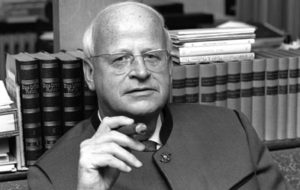
The man who studies theology, and especially he who studies dogmatics, might watch carefully whether he increasingly does not think in the third rather than in the second person. You know what I mean by that. This transition from one to the other level of thought, from a personal relationship with God to a merely technical reference, usually is exactly synchronized with the moment that I no longer can read the word of Holy Scripture as a word to me, but only as the object of exegetical endeavors. This is the first step towards the worst and most widespread minister’s disease. For the minister frequently can hardly expound a text as a letter which has been written to him, but he reads the text under the impulse of the question, How would it be used in a sermon?
I have been a minister and say this also to myself. We might remember that Anselm begins his demonstration of God in his Prologue with a prayer, and that his dogmatics were therefore prayed dogmatics. This extraordinary fact would be understood altogether wrongly if seen as only an edifying preamble and therefore a sign of a special kind of piety. Anselm is here looking for nothing else than the expression of something that theologically is strongly relevant: a theological thought can breathe only in the atmosphere of dialogue with God.
Essentially, theological method is characterized by the fact that it takes into account that God has spoken, and that now what God has spoken is to be understood and answered. But it can only be understood when I
(1) recognize that what has been said is directed to me, and
(2) become involved in formulating a reply.
Only out of this dialogue is the theological method comprehensible (Gal. 4:9). Consider that the first time someone spoke of God in the third person and therefore no longer with God but about God was that very moment when the question resounded, “Did God really say?” (cf. Genesis 3:1). This fact ought to make us think.
In contrast with this, the crucified Jesus, out of the uttermost darkness of abandonment by God, does not speak to men, does not complain about this God who has abandoned Him. He speaks to Him at this very moment—in the second person. He addresses Him as My God and even expresses His complain in a word of God, so that as it were the circuit between Him and the Father is complete. This observation too, should make us think.
Helmut Thielicke (1908-1985)
A Little Exercise for Young Theologians
My source: For All The Saints, volume 2, year 1, 845-845
